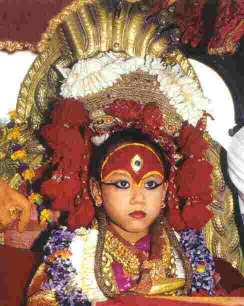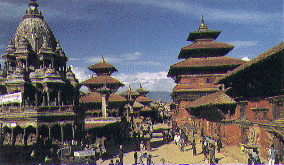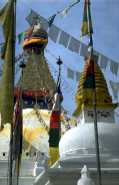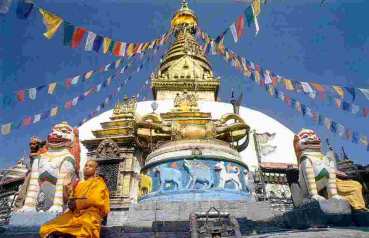†
Kathmandu
Tour begins at the historic seat of Royalty. Known as the Hanuman Dhoka. This
Durbar [palace] square named after Human mythical monkey Ėgod is surrounded by
old temples known for their erotic carvings in their wooden struts and windows like the
following: Basantpur Durbar also known as Nautale Durbar [or Nine storeyed
palace] built by king Prithvi Narayan Shah, the founder of modern Nepal. Temple
of Kumari means Nepalís Virgin Goddesses. The temple itself is a richly carved
Pagoda- style building and a piece of beauty. Kasthmandap to have been built in
1059 AD from the timber of a single tree, this is another pagoda-styled
architectural showpiece from which the name of Kathmandu has been derived. Other
Ďmustsí in the Durbar Square area include architectural masterpiece like the
Taleju Bhawani Temple, Shiva Parbati temple and the Makhan Pashupatinath,
besides the awesome sculpture in granite, the colossal Kal Bhairav and Pratap
Mallaís black stone tablet containing inscription in 13 languages.
Swayambhunath from Hanuman Dhoka we move on to a milock which rises about 2000
feet above the valley Ėlevel land is famous for its 2000 year old stupa of
Swayambhunath surrounded by various other temples and small chaityas. This also
provides a breath taking birdís eye view of Nepalís capital valley with high
snow capped mountains like the Ganesh Himal forming a beautiful backdrop.
Pashupatinath is Nepalís most famous religious site on the banks of the holy
Bagmati River. Guhyeshweri an their ancient and holy site just a kilometer away
from the Pashupatinath and forms a complimentary to it because it is dedicated
to goddess Parvati consort of Lord Shiva known also as Pashupati. Baudanath
stupa known also as the khasti chaitya and nick named
known for their erotic carvings in their wooden struts and windows like the
following: Basantpur Durbar also known as Nautale Durbar [or Nine storeyed
palace] built by king Prithvi Narayan Shah, the founder of modern Nepal. Temple
of Kumari means Nepalís Virgin Goddesses. The temple itself is a richly carved
Pagoda- style building and a piece of beauty. Kasthmandap to have been built in
1059 AD from the timber of a single tree, this is another pagoda-styled
architectural showpiece from which the name of Kathmandu has been derived. Other
Ďmustsí in the Durbar Square area include architectural masterpiece like the
Taleju Bhawani Temple, Shiva Parbati temple and the Makhan Pashupatinath,
besides the awesome sculpture in granite, the colossal Kal Bhairav and Pratap
Mallaís black stone tablet containing inscription in 13 languages.
Swayambhunath from Hanuman Dhoka we move on to a milock which rises about 2000
feet above the valley Ėlevel land is famous for its 2000 year old stupa of
Swayambhunath surrounded by various other temples and small chaityas. This also
provides a breath taking birdís eye view of Nepalís capital valley with high
snow capped mountains like the Ganesh Himal forming a beautiful backdrop.
Pashupatinath is Nepalís most famous religious site on the banks of the holy
Bagmati River. Guhyeshweri an their ancient and holy site just a kilometer away
from the Pashupatinath and forms a complimentary to it because it is dedicated
to goddess Parvati consort of Lord Shiva known also as Pashupati. Baudanath
stupa known also as the khasti chaitya and nick named  the
"temple of dew drops"; this is believed to one of the most massive
Buddhist stupas in the whole of Asia. Another attraction here is the carpet
weaving industry mostly operated manually by the Tibetan community there by
giving you an impression that you are in a "mini" Tibet if not already
Tibet. The temple of Dakshinkali is situated about 18 km. South of Kathmandu
city and is an important place of Hindu pilgrimage, but those who cannot stomach
the grisly sight of bloody animal sacrifices which is routine there, can choose
a more peaceful retreat like Budanilkantha, about 10 km. north of city to see
the mammoth blue granite statue of the reclining Vishnu. On your return, a visit
to the Balaju water garden with its 22 old stone water-faucets, a swimming pool
and a fishpond will help refresh oneself.
the
"temple of dew drops"; this is believed to one of the most massive
Buddhist stupas in the whole of Asia. Another attraction here is the carpet
weaving industry mostly operated manually by the Tibetan community there by
giving you an impression that you are in a "mini" Tibet if not already
Tibet. The temple of Dakshinkali is situated about 18 km. South of Kathmandu
city and is an important place of Hindu pilgrimage, but those who cannot stomach
the grisly sight of bloody animal sacrifices which is routine there, can choose
a more peaceful retreat like Budanilkantha, about 10 km. north of city to see
the mammoth blue granite statue of the reclining Vishnu. On your return, a visit
to the Balaju water garden with its 22 old stone water-faucets, a swimming pool
and a fishpond will help refresh oneself.
Patan
Situated about 5 km east of Kathmandu. Patan is one of the three oldest
cities of the Kathmandu valley. Even the Indian emperor Ashoka is said to have
built  four
stupas here in third century BC, which can still be seen today. Metal craft
center that reveal Nepalís past and present glory can also be easily visited
in this city of arts and crafts. Other landmarks worth visiting include. One of
Patanís main attraction is the place square situated of the center of the
city. It is full of ancient temples and shrines with exquisite carvings, such as
the Krishna temple, Bhimsen temple, Hiranyavarna mahavihar [also known as golden
temple], Mahaboudha, Minnath, Machhendranath, Khembheshwar etc. Nearby we visit
the Tibetan refugees handicraft center, also known as "Nepalís little
Tibet".
four
stupas here in third century BC, which can still be seen today. Metal craft
center that reveal Nepalís past and present glory can also be easily visited
in this city of arts and crafts. Other landmarks worth visiting include. One of
Patanís main attraction is the place square situated of the center of the
city. It is full of ancient temples and shrines with exquisite carvings, such as
the Krishna temple, Bhimsen temple, Hiranyavarna mahavihar [also known as golden
temple], Mahaboudha, Minnath, Machhendranath, Khembheshwar etc. Nearby we visit
the Tibetan refugees handicraft center, also known as "Nepalís little
Tibet".
†
Bhaktapur and Changu Narayan
Its about 14 km east of Kathmandu city, Bhadgaon or Bhaktapur, founded in the
ninth century, means "The city of Devotees", and is renowned for its
ancient pottery and traditional weaving industries besides exquisite temple
architecture, as in the case of Kathmandu and Patan. Major sight seeing will
include: The place square is the main square  of
the city and contains in number able temple and other architectural show pieces
such as the Lion Gate, the golden Gate, the Place of fifty five windows, the big
bell of the barking dogís etc. besides Nepalís well known treasure house of
ancient and medieval paintings, the picture Gallery. Nyatapola Temple a five
storied pagoda style temple, the tallest in the city, was built in 1708 AD and
well known for its massive structure and subtle workmanship including an array
of huge sculptures representing hefty wrestlers, elephants, lions and griffins.
Another 15th cent8ury temple believed to have been built from views
of Dhaulagiri, Annapurna, Fishtail, Manasalu and others. The beauty of the
valley is out of the timber of a signal tree. 20 minute drive up hill takes us
to the most ancient pagoda style temple in Nepal is known as Chug Narayan,
richly decorated with artistic engravings and beautiful statues. On the way back
a visit to the ancient town of Thimi will be very rewarding.
of
the city and contains in number able temple and other architectural show pieces
such as the Lion Gate, the golden Gate, the Place of fifty five windows, the big
bell of the barking dogís etc. besides Nepalís well known treasure house of
ancient and medieval paintings, the picture Gallery. Nyatapola Temple a five
storied pagoda style temple, the tallest in the city, was built in 1708 AD and
well known for its massive structure and subtle workmanship including an array
of huge sculptures representing hefty wrestlers, elephants, lions and griffins.
Another 15th cent8ury temple believed to have been built from views
of Dhaulagiri, Annapurna, Fishtail, Manasalu and others. The beauty of the
valley is out of the timber of a signal tree. 20 minute drive up hill takes us
to the most ancient pagoda style temple in Nepal is known as Chug Narayan,
richly decorated with artistic engravings and beautiful statues. On the way back
a visit to the ancient town of Thimi will be very rewarding.
†
Nagarkot (Sun rise and Sun set)
It is 32 km from Kathmandu it is provide to you a very beautiful, charming,
breathtaking, armchair panorama of the high Himalaya including Mt Everest,
Manaslu, Ganesh Himal, Langtang, Choba Bamare, Gauri Sankar and Other. It is
very popular for viewing of sunrise and sunset.
†
Pokhara
Pokhara is 200km from Kathmandu. This is one of the very nice and beautiful
palace of Nepal .It is also a one of the tourist place. In here you can enjoy
with nieces now copped panoramic enhanced by its lovely lakes like Rupa Phewa
and Begnas which reflect the mountain Vistas in the all their grandeur also the
nice waterfall and temples.
†


![]()